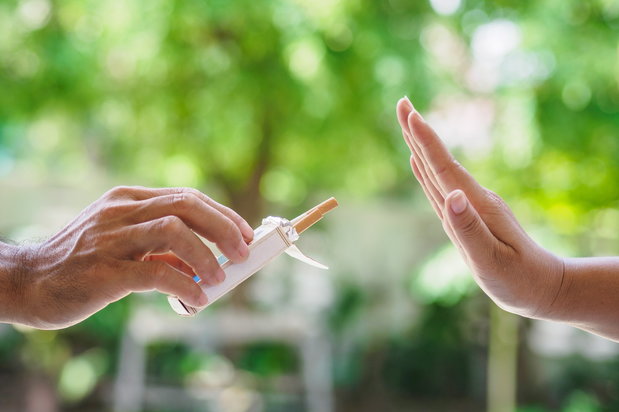To smoke or not to smoke cigarettes? That is a question many in recovery will encounter at some point, whether you have been a longtime smoker or start smoking during the early stages of your recovery.
Although this is a personal choice, it may be as complex and unique as each person's recovery. There are two schools of thought on this ongoing debate.
Is smoking used as a crutch (despite health concerns) to help ward off intense cravings that may increase the possibility of relapse? Or, is it simply swapping one addiction for another?
Let's explore both sides.
Continuing to Smoke
At 12-step meetings across the country, there is one item that is almost always present: lots and lots of cigarettes.
I remember on many occasions standing outside the meetings with other smokers pleading our cases to each other about why we needed to keep cigarettes in our lives.
The growing consensus was that quitting smoking would threaten our sobriety, as it can actually help minimize our cravings. We have too much stress in our lives already to quit right now. We still want to socialize at gatherings. Many of the women (myself included) were concerned about weight gain after quitting cigarettes.
We all agreed that quitting drugs and/or alcohol had been difficult enough. If we kept smoking, so what? What health risks? It’s not as bad as drinking, that’s for sure. For most recovering addicts, smoking is seen as harmless, as it won’t hurt our relationships or our jobs like when we were using.
Although these are valid reasons for some, some struggle when deciding to quit. It can seem overwhelming to give up cigarettes, but—like overcoming drug or alcohol addiction—this feat can be achieved.
Quitting Cigarettes
According to Psychology Today, the benefits of smoking cessation can actually help recovery since alcohol and drug use often goes hand in hand with smoking. The urge to drink or use is often triggered whenever a person lights up, and when alcoholism and smoking co-occur, smoking tends to continue into recovery.
There are several other reasons to quit smoking as you move forward in your recovery. First and foremost, your health. Saving money by avoiding the soaring cost of smoking is a huge benefit as well. Your time with friends and family will be more enjoyable as you’re not constantly excusing yourself to go out for a smoke during dinner, movies, traveling together and other fun activities.
These are just a few benefits to quitting.
Health Benefits of Quitting Smoking
Your body—which has been craving to repair itself—starts doing just that immediately after giving up cigarettes. After smoking your last cigarette, within 20 minutes blood pressure drops and the heart rate returns to normal. Lung function improves within a month, along with that nagging smoker’s cough.
The benefits just continue year after year. After 15 smoke-free years, the risk of heart disease and stroke rivals that of a non-smoker.
Over 20 years ago in early recovery, I was confronted with my own dilemma to continue or quit smoking. I chose the latter. It was far from easy and took a few failed attempts before I was able to drop the habit for good.
My young son—after learning of the dangers of smoking in school—became my biggest motivation. He was convinced I was going to die. Whenever I purchased a pack of smokes, he hid them, flushed them down the toilet or crushed them in front of me as he ran off crying.
The time had finally come to quit, and I did so on his birthday.
The Choice is Yours
If and when you decide to quit, here are some tips you may find helpful.
First, enlist support from friends and family. Decide on a date to quit, and remove all ashtrays and lighters from your home. For some, prescription aids such as the patch or Chantix may be needed for short-term use. Discuss with your physician if these cessation aids are suitable for you.
Resist the urge to “have just one” and accept that cravings will come and they will also subside. Avoid triggers at social events, at least in the beginning. Chew sugarless gum or hard candy. Start a new and gentle exercise plan.
Now may be a good time to take up a new hobby and keep your hands busy. Perhaps you can even try the old rubber band around the wrist method. Find what works for you and helps you achieve this goal.
This topic will always be up for debate, and family members and friends will surely chime in with their views. Ultimately, each person needs to make the choice for themselves and determine when and if the time is right for their personal recovery.
|
If you or someone you know is seeking help from addiction, please visit our directory of treatment centers or call 800-772-8219 to speak to a treatment specialist. |








